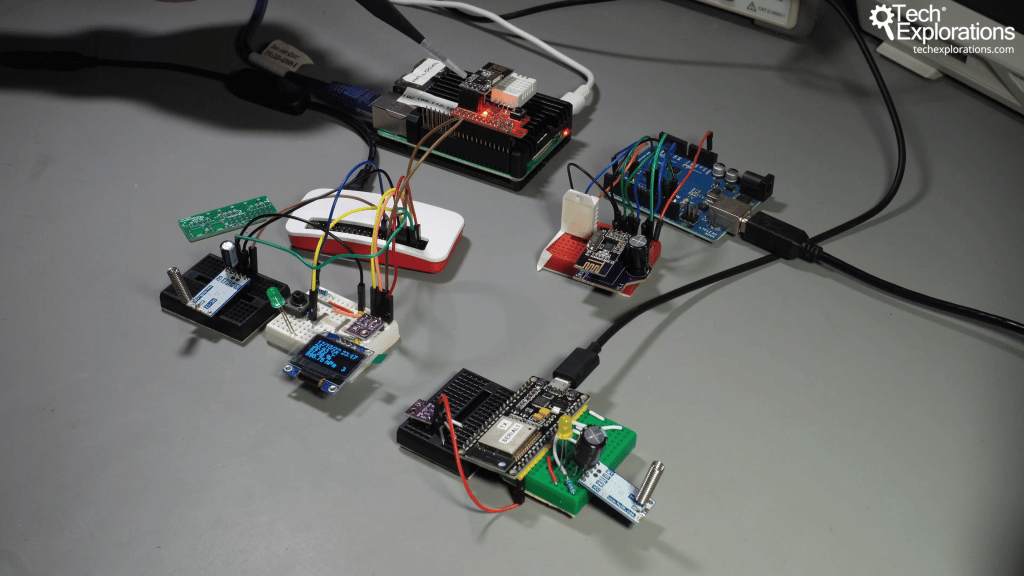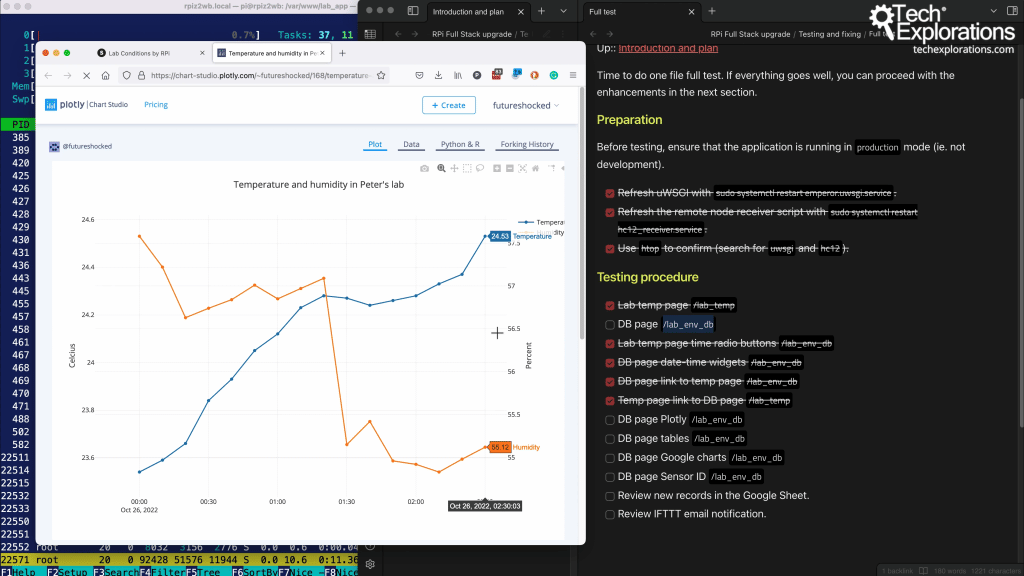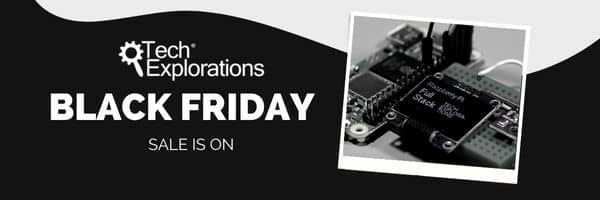Our new course, Raspberry Pi Full Stack Upgrade Project, is now published!
See our Black Friday offer at the bottom of this post.
This course is perfect for original Raspberry Pi Full Stack graduates and will teach you how to upgrade your application with new hardware and capabilities.
In the original Raspberry Pi Full Stack (last updated in August 2022), you learned how to create an Internet of Things web application based on a Raspberry Pi from the ground up. The Full Stack application includes a local web server application written in Python and JavaScript, sensors, buttons and LEDs, and Cloud services like If-This-Then-That, Google Sheets, Google Charts, Plotly and the low-cost nRF24 transceiver to enable radio communications between the Raspberry Pi and Arduino nodes. This classic course is a whirlwind tour of full-stack web application development on the Raspberry Pi that introduces you to many modern technologies that are tightly integrated into a single application.
In the new Upgrade Project course, you will learn how to improve your Full Stack application with new hardware and capabilities and improve your Maker knowledge and skills.
The upgraded Full Stack application utilises the Raspberry Pi Zero 2 W single-board computer and the ESP32 microcontroller – although you can use any Raspberry Pi and Arduino-compatible board.
The two nodes communicate via a modern radio transceiver (the HC-12). They can sense their environment using the BME280, show their status on an organic LED display and a web interface, log data on the Cloud, and trigger notifications when specific conditions arise.

As part of the course and the upgrade process, you will practice and upgrade your skills in the Linux operating system, Python, Flask, Javascript/jQuery, Plotly, Google Charts, HTML/CSS, and IFTTT.
One of my objectives in designing this new course was to create an opportunity for students to improve their “soft” maker skills. With the term “soft knowledge and skills”, I classify improvements in analysis, design, and planning from working on large projects.
In such projects, you must spend time and effort to understand both the big picture, as well as the implementation details. You must consider the project’s overall technical objectives, how the end user will interact with the application, and the implementation constraints and tradeoffs. Those constraints and tradeoffs are particularly complicated because they are informed by numerous inputs, such as the project’s technical requirements, technical limitations and conflicts, your current skill level, and your available resources, such as time and budget.

In this project, you will have the opportunity to work on your Maker soft skills on an existing project. Rather than starting from a blank slate, you must evaluate what you already have, and decide what to keep, what to throw out, and what to change. The student will experience my thinking through my exposed, comprehensive personal notes. This is the first course I chose to show you exactly how I work on a problem, document it, implement the solution, and test it.
In this course, you will improve your ability to build a full-stack application based on the Raspberry Pi, the ESP32 and a combination of software tools and technologies.
Make no mistake: this is not an “easy” course nor a trivial application. You will gain the most by following me in the actual implementation of your version of the upgraded Raspberry Pi Full Stack application, where you will inevitably have to struggle with (and overcome) unexpected bumps along the road.
What to do next?
If you are a Raspberry Pi Full Stack graduate, prepare for a deeper dive into Raspberry Pi full stack development. Learn more about the new course here. If you are a subscriber, you can find the new course on your courses page.
If you have not yet completed Raspberry Pi Full Stack, I recommend doing so before attempting the Upgrade Project course. The original course contains many important instructions that I do not repeat in the sequel course.
Our Black Friday 2022 offer

This year we are extending our biggest Black Friday offer ever.
Until November 30, you can use coupon code
–> BF2022 <–
and get a 25% discount on
any course or subscription option.
This Black Friday offer is valid for all of our courses at the Solo and Community tiers (Mentor is excluded) and monthly and yearly subscriptions.
But wait… there’s more 🙂
Hardware offer from Sunfounder
In collaboration with Sunfounder, you can purchase three of their best kits at a 20% discount.
The discounted kits are:
- SunFounder Starter Kit for Arduino Mega 2560 (great for Arduino Step by Step Getting Serious).
- Raspberry Pi Starter Kit (Da Vinci) for Beginners (great for any of our Raspberry Pi courses).
- Raspberry Pi Pico Starter kit (Thales) for Beginners (great for our Micropython course).
To claim your 20% off on the hardware, follow these steps:
- Click on the kit link(s) above.
- Add the kit to your shopping cart.
- At the checkout, copy the coupon code –> X2Z2ZN0WS88Y <– in the “Discount coupon” field and click “Apply”.
- With the discount applied, continue with the checkout process.
Enjoy!
